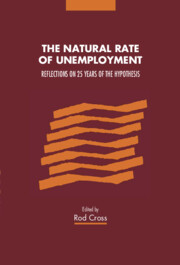Book contents
- Frontmatter
- Contents
- List of Contributors
- Preface
- 1 Introduction
- Part I The theoretical framework
- Part II Adjustment, ranges of equilibria and hysteresis
- Part III Empirical tests and macro models
- 11 The natural rate hypothesis and its testable implications
- 12 Non-linear dependence in unemployment, output and inflation: empirical evidence for the UK
- 13 Prices, wages and employment in the US economy: a traditional model and tests of some alternatives
- 14 The natural rate in empirical macroeconomic models
- Part IV Political economy
- Index
14 - The natural rate in empirical macroeconomic models
Published online by Cambridge University Press: 03 May 2011
- Frontmatter
- Contents
- List of Contributors
- Preface
- 1 Introduction
- Part I The theoretical framework
- Part II Adjustment, ranges of equilibria and hysteresis
- Part III Empirical tests and macro models
- 11 The natural rate hypothesis and its testable implications
- 12 Non-linear dependence in unemployment, output and inflation: empirical evidence for the UK
- 13 Prices, wages and employment in the US economy: a traditional model and tests of some alternatives
- 14 The natural rate in empirical macroeconomic models
- Part IV Political economy
- Index
Summary
Introduction
I want to argue two propositions in this chapter. The first is that the concept of a natural rate can and has played a positive role in the development of econometric macroeconomic models. The second, and more interesting from a theoretical point of view, is that in future macroeconometric models may be able to tell us about some of the important limitations of the natural rate concept.
The natural rate concept is useful to econometric modellers because it provides a disciplining device or consistency check. By their nature econometric models tend to pick up a number of theoretical inconsistencies or mistakes in their development, and the examination of a systems property like the natural rate can be useful in picking these errors up.
Is there a useful flow of information in the other direction? Have econometric models told us much about the natural rate? For the past the answer is essentially ‘no’: while theory does respond to empirical evidence, it has not responded positively to the evidence provided by macroeconometric models. My second proposition is that this situation could change in the future. I illustrate this with three examples of departures from the natural rate, where in each case econometric models may be in a position to inform theoretical analysis.
The natural rate as a systems check
Most academic macroeconomists prefer to distance themselves from the properties of established empirical macro models.
- Type
- Chapter
- Information
- The Natural Rate of UnemploymentReflections on 25 Years of the Hypothesis, pp. 299 - 312Publisher: Cambridge University PressPrint publication year: 1995
- 1
- Cited by



